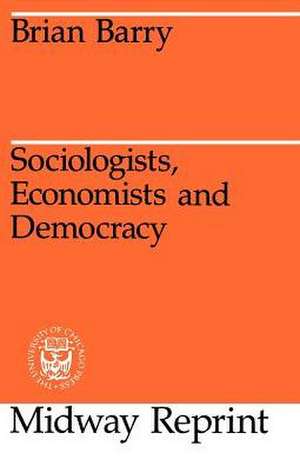Sociologists, Economists, and Democracy
Autor Brian Barryen Limba Engleză Paperback – 31 aug 1988
"Rationalist theories of political behavior have recently risen in status to that of a new—or, more accurately, rediscovered—paradigm in the systematic study of politics. Brian Barry's short, provocative book played no small part in the debate that precipitated this shift. . . . Without reservation, Barry's treatise is the most lucid and most influential critique of two important, competing perspectives in political analysis: the 'sociological' school of Talcott Parsons, Gabriel Almond, and other so-called functionalists; and the 'economic' school of Anthony Downs and Mancur Olson, among others."—Dennis J. Encarnation, American Journal of Sociology
Preț: 260.52 lei
Nou
Puncte Express: 391
Preț estimativ în valută:
49.86€ • 51.85$ • 41.72£
49.86€ • 51.85$ • 41.72£
Carte tipărită la comandă
Livrare economică 15-29 martie
Preluare comenzi: 021 569.72.76
Specificații
ISBN-13: 9780226038247
ISBN-10: 0226038246
Pagini: 212
Dimensiuni: 137 x 213 x 15 mm
Greutate: 0.23 kg
Ediția:1
Editura: University of Chicago Press
Colecția University of Chicago Press
ISBN-10: 0226038246
Pagini: 212
Dimensiuni: 137 x 213 x 15 mm
Greutate: 0.23 kg
Ediția:1
Editura: University of Chicago Press
Colecția University of Chicago Press
Cuprins
Chapter 1 - Introduction
1. The State of Political Theory
2. The Two Approaches Outlined
3. Ideological Origins: Sociological Approach
4. Ideological Origins: Economic Approach
5. Subjects to be Covered
Chapter II - Political Participation as Rational Action
1. The Decision to Vote: Downs and Riker
2. The Decision to Vote: Limits of the Economic Approach
3. The Basic Logic of Olson's Theory
4. Application of Olson's Theory
5. Participation in Collective Action: Some Explanations
6. Selective Incentives as Explanations
7. Leadership and Collective Action
8. Conditions of Economic Rationality
Chapter III - Values and Stable Democracy: Three Theories
1. Introduction
2. Almond and Verba
3. Eckstein
4. Lipset
Chapter IV - Values and Democratic Stability: the Setting and the Problems
1. Introduction
2. Parsons on the 'Hobbesian Problem'
3. Parsons on Norms and Values
4. Values and Social Order
5. Values as Explanations
6. The Problem of Causal Inference
7. How Important are Values?
Chapter V - The Economic Theory of Democracy
1. The Downsian Model Introduced
2. Information Costs and Strategic Abstention
3. Multi-Party Systems
Chapter VI - Testing Theories of Democracy (1)
1. Issues and Voting Decisions: U.S. Data
2. Issues and Voting Decisions: Non-U.S. Data
3. The Problems of Dimensions
4. What is an Issue?
Chapter VII - Testing Theories of Democracy (2)
1. The Aims of Political Parties
2. The Effects of Party Competition
3. Some Sociological Explanations
4. Justifications of Democracy
Chapter VIII - Conclusion
1. Conceptions of 'Theory'
2. Conceptions of 'System' and 'Equilibrium'
3. Underlying Values
4. Implicit Assumptions
5. Relationship of the Two Approaches
Bibliography (with a Postscript 1978)
Subject Index
1. The State of Political Theory
2. The Two Approaches Outlined
3. Ideological Origins: Sociological Approach
4. Ideological Origins: Economic Approach
5. Subjects to be Covered
Chapter II - Political Participation as Rational Action
1. The Decision to Vote: Downs and Riker
2. The Decision to Vote: Limits of the Economic Approach
3. The Basic Logic of Olson's Theory
4. Application of Olson's Theory
5. Participation in Collective Action: Some Explanations
6. Selective Incentives as Explanations
7. Leadership and Collective Action
8. Conditions of Economic Rationality
Chapter III - Values and Stable Democracy: Three Theories
1. Introduction
2. Almond and Verba
3. Eckstein
4. Lipset
Chapter IV - Values and Democratic Stability: the Setting and the Problems
1. Introduction
2. Parsons on the 'Hobbesian Problem'
3. Parsons on Norms and Values
4. Values and Social Order
5. Values as Explanations
6. The Problem of Causal Inference
7. How Important are Values?
Chapter V - The Economic Theory of Democracy
1. The Downsian Model Introduced
2. Information Costs and Strategic Abstention
3. Multi-Party Systems
Chapter VI - Testing Theories of Democracy (1)
1. Issues and Voting Decisions: U.S. Data
2. Issues and Voting Decisions: Non-U.S. Data
3. The Problems of Dimensions
4. What is an Issue?
Chapter VII - Testing Theories of Democracy (2)
1. The Aims of Political Parties
2. The Effects of Party Competition
3. Some Sociological Explanations
4. Justifications of Democracy
Chapter VIII - Conclusion
1. Conceptions of 'Theory'
2. Conceptions of 'System' and 'Equilibrium'
3. Underlying Values
4. Implicit Assumptions
5. Relationship of the Two Approaches
Bibliography (with a Postscript 1978)
Subject Index
